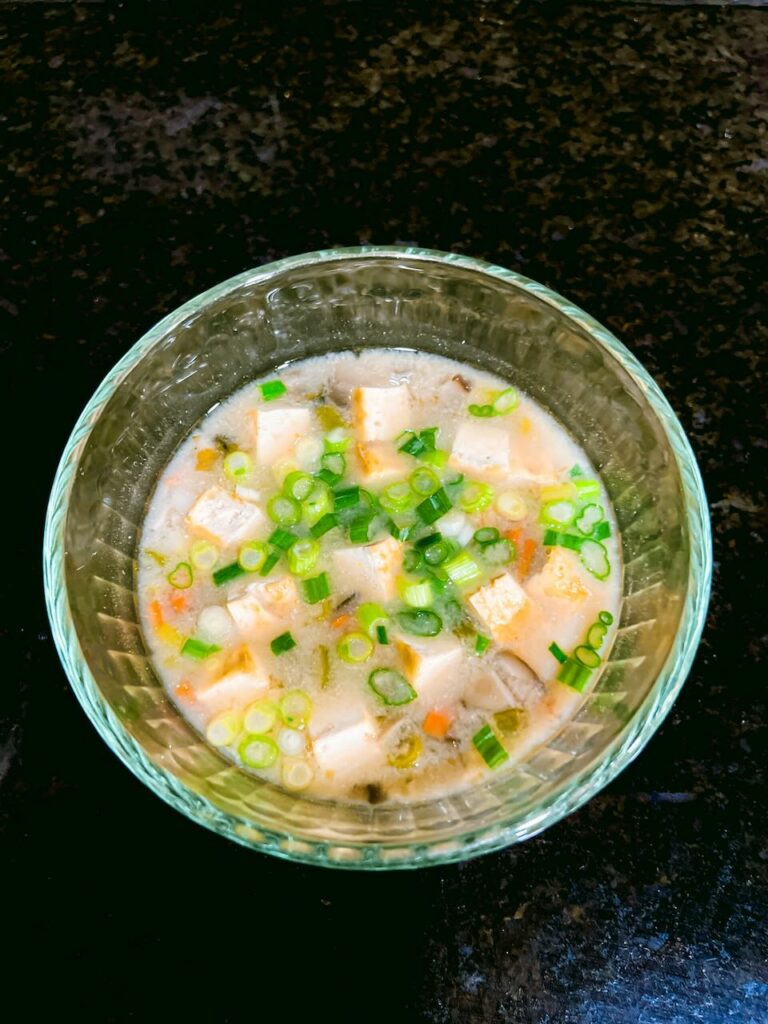
Vegan Miso Soup – With Shiitake Mushroom

Vegan Miso Soup is an adaptation of one of the most iconic Japanese dishes. For this recipe, I have used a unique vegetable-based dashi (The base soup), featuring shiitake mushrooms, carrots, celery, and onion to create a rich, flavorful broth suitable for vegans and those without access to traditional kombu (dried kelp - type of seaweed) and bonito (fish) flakes.
Miso Soup: Cultural Background and Evolution
Miso soup, or "Miso-shiru," is an integral part of Japanese cuisine and culture, a dish that has been enjoyed for centuries as both a comfort food and a daily dietary staple. With its origins tracing back to the Asuka period (552-645 AD), miso soup represents a fundamental aspect of Japanese gastronomy: a harmonious blend of simplicity, nutrition, and taste. At its core, miso soup is composed of miso paste—a fermented ingredient—and dashi, a light broth that serves as the flavorful foundation for many Japanese dishes. Its comforting and warm character makes it an ideal choice for breakfasts, lunches, and dinners across Japan and beyond.
Miso soup’s nutritional value is immense. It is rich in probiotics (thanks to the fermented miso paste), vitamins, minerals, and antioxidants. The vegetables used in the dashi add further nutrients, making this soup a great choice for boosting immunity, supporting digestion, and promoting overall wellness.
Miso itself is a fermented paste made primarily from soybeans, salt, and koji—a type of mold that promotes fermentation. The fermentation process yields a deeply umami flavor, giving miso its characteristic savory taste and aroma. The umami-rich quality of miso is the essence of miso soup and is considered one of the five basic tastes in Japanese cuisine. The traditional preparation of miso soup typically includes tofu, wakame (a type of edible seaweed), and green onions, providing a balanced mix of flavors and textures that are both comforting and rejuvenating.
Cultural Significance and Evolution
Miso soup has transcended its original role as a ceremonial dish and evolved into a meal enjoyed by people of all backgrounds in Japan. It is often found alongside steamed rice as part of a traditional Japanese breakfast or served as a starter in multi-course meals. Historically, miso was highly valued for its long shelf life and portability, which made it a crucial food source for samurai warriors, who would carry it in its paste form during their travels.
The evolution of miso soup is closely tied to regional diversity in Japan, with different varieties of miso—white (shiro), red (aka), and mixed (awase)—influencing the flavor of the soup. The miso paste used is often chosen based on personal preference, with shiro miso providing a milder, sweeter flavor, while aka miso is more robust and intense. Over time, miso soup has adapted to include a variety of ingredients depending on the season and availability, making it highly versatile and customizable.
As Japanese cuisine spread globally, miso soup also made its way to the international culinary scene, becoming a popular dish among those seeking healthy and nutritious options. For worldwide readers, miso soup is not only a representation of Japanese culinary heritage but also a dish that embodies wellness and sustainability. The ease of preparation, minimalistic ingredients, and deeply satisfying taste have all contributed to its increasing popularity, especially among those following plant-based or vegan diets.
Nutritional Value
Vegan miso soup is a powerhouse of nutrition, offering a variety of health benefits:
- Miso Paste: Miso is made from fermented soybeans, which contain beneficial probiotics that support gut health. It is also a good source of vitamins and minerals, including manganese, vitamin K, and copper.
- Tofu: Tofu adds plant-based protein and essential amino acids, making this soup a satisfying meal option. It's also rich in iron and calcium.
- Seaweed: Seaweed, such as nori or wakame, contains iodine, which is essential for healthy thyroid function, along with a variety of vitamins and antioxidants.
- Shiitake Mushrooms: These mushrooms add depth to the broth while providing important nutrients such as vitamin D, selenium, and polysaccharides that boost immunity.
Vegan Adaptation: Ingredients and Variations
Traditionally, dashi is made from kombu (dried kelp) and katsuobushi (bonito (fish) flakes), which provide a deeply savory, umami flavor. However, for a vegan version of miso soup, I have prepared the dashi using plant-based ingredients without compromising on flavor. In this adaptation, I have used shiitake mushrooms, carrots, celery, and onions to create a rich, vegetable-based broth. Shiitake mushrooms, in particular, are known for their strong umami taste, making them an excellent replacement for bonito flakes.
You may try other variations of vegan miso soup as below:
- Vegetable-Enhanced Miso Soup: Adding vegetables like spinach, daikon radish, or bok choy can make the soup more hearty and nutritious.
- Grain-Added Miso Soup: Including grains like quinoa or barley adds additional texture and makes the dish more filling.
- Seaweed Variety: Wakame is the most common seaweed used, but other varieties like nori or hijiki can be included for different flavors and textures.
- Spicy Miso Soup: Adding a touch of chili paste or fresh ginger gives the soup a spicy kick, which can be particularly comforting in cold weather.
The Global Appeal of Vegan Miso Soup
As people around the world embrace plant-based eating for health, ethical, or environmental reasons, vegan miso soup has become a popular dish for those seeking a wholesome, nutrient-dense meal. Its versatility makes it easy to adapt to different tastes and dietary preferences. Whether served as an appetizer, a light meal, or as part of a larger spread, vegan miso soup is a perfect representation of Japanese culinary traditions that can be appreciated by everyone, regardless of cultural background or dietary restrictions.
With its delicate balance of flavors, rich umami taste, and significant health benefits, vegan miso soup is a dish that nourishes both body and soul, offering a warm and satisfying experience that transcends borders.
Vegan Miso Soup is a nourishing take on the classic Japanese dish, blending a vegetable-based dashi made from shiitake mushrooms, carrots, celery, and onions with umami-rich miso paste. This plant-based version is full of flavor, nutrients, and probiotics—perfect for a comforting, healthy meal that celebrates Japanese culinary tradition.
- 6 cups water
- 2 Cups shiitake mushrooms, chopped
- 2 medium carrot, roughly chopped
- 4 celery stalks, roughly chopped
- 2 medium onion, quartered
- 4 tablespoons miso paste (white or red, depending on preference)
- 1 cup soft tofu, cut into small cubes
- 2 tablespoon dried wakame seaweed
- 2 green 2-3 onions, thinly sliced
- 1 In a medium pot, combine water with shiitake mushrooms, chopped carrot, celery, and onion.
- 2
Bring the pot to a gentle simmer over medium heat, then reduce to low heat and allow it to simmer for 20-30 minutes. This helps the vegetables and mushrooms release their flavors, creating a rich, umami-packed broth.- 3
Once done, strain the broth using a fine-mesh sieve into a clean bowl or pot, discarding the solids. The broth should be golden and aromatic.Prepare the Soup:- 4
Return the strained broth to the pot and heat gently. Take a ladle of the hot broth and place it in a small bowl.- 5
Add the miso paste to the bowl and mix until fully dissolved, creating a smooth mixture. This helps avoid lumps when adding the miso to the soup.- 6
Gradually return the dissolved miso mixture to the simmering pot. Keep the heat low to prevent boiling, as high heat can kill the beneficial probiotics in the miso paste.Add the Remaining Ingredients:- 7
Stir in the tofu cubes and wakame seaweed. Let the soup cook for another 2-3 minutes until the tofu is heated through and the wakame has expanded.- 8
Remove from heat and add the thinly sliced green onions.Serve:- 9
Ladle the miso soup into individual bowls and serve immediately while warm.NotesServing Notes:
- Vegan miso soup is best served fresh to preserve the probiotics and the delicate flavors of the broth. It makes a great accompaniment to a Japanese-inspired meal, alongside steamed rice and pickled vegetables.
- For added variety, you can incorporate other vegetables such as spinach, bok choy, or sliced mushrooms.
Storage Notes:
- Store leftover miso soup in an airtight container in the refrigerator for up to 2 days. For optimal health benefits, add the miso paste just before serving if reheating the soup.
- Avoid reheating the soup to a boiling temperature, as this will diminish the probiotic content of the miso paste.
Vegan miso soup recipe, vegan Japanese miso soup, plant-based miso soup, shiitake mushroom dashi, vegan comfort food, healthy vegan soup, miso soup with tofu, nutritious Japanese recipes. - 2
